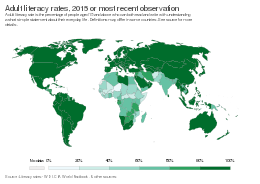
Literacy
Ability to read and write / From Wikipedia, the free encyclopedia
Dear Wikiwand AI, let's keep it short by simply answering these key questions:
Can you list the top facts and stats about Literacy?
Summarize this article for a 10 years old
Literacy in its broadest sense describes "particular ways of thinking about and doing reading and writing"[1] with the purpose of understanding or expressing thoughts or ideas in written form in some specific context of use.[2] In other words, humans in literate societies have sets of practices for producing and consuming writing, and they also have beliefs about these practices.[3] Reading, in this view, is always reading something for some purpose; writing is always writing something for someone for some purpose.[4] Beliefs about reading, writing and their value for society and for the individual always influence the ways literacy is taught, learned, and practiced.[5]
| Part of a series on |
| Reading |
|---|
 |
|
Scientific theories and models |
|
Cognitive processes |
|
Reading rate |
|
Reading differences and disabilities |
Some researchers suggest that the study of "literacy" as a concept can be divided into two periods: the period before 1950, when literacy was understood solely as alphabetical literacy (word and letter recognition); and the period after 1950, when literacy slowly began to be considered as a wider concept and process, including the social and cultural aspects of reading and writing[6] and functional literacy.[7][8]
